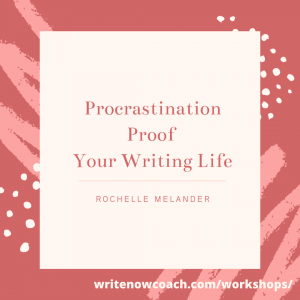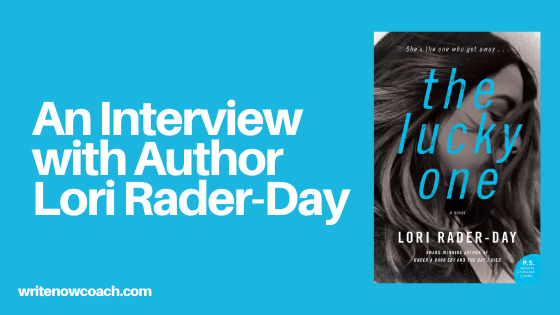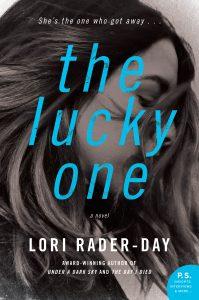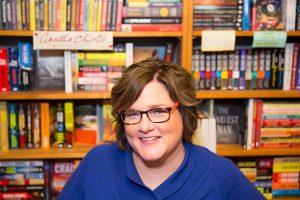Writers@Work: Lori Rader Day on Writing through Challenges
18 February 2020
Note From Rochelle
Dear Writers,
 Did you know that just changing your mindset about a project can help you stop procrastinating? That’s just one of the tips I’ll share with you at my class Procrastination Proof Your Writing Life. You can sign up at my workshop page. It’s completely free to attend live. And note: the sign up tool is a little wonky! Once you click schedule appointment, you will need to set your time zone, then click on the date (March 2) and choose “continue” before you can enter your information.
Did you know that just changing your mindset about a project can help you stop procrastinating? That’s just one of the tips I’ll share with you at my class Procrastination Proof Your Writing Life. You can sign up at my workshop page. It’s completely free to attend live. And note: the sign up tool is a little wonky! Once you click schedule appointment, you will need to set your time zone, then click on the date (March 2) and choose “continue” before you can enter your information.
I am delighted to welcome my friend and colleague, Lori Rader-Day to the blog. Lori will be at Boswell Book Company this Thursday, February 20 (7:00 PM) in conversation with Erica Ruth Neubauer.
Enjoy!
Rochelle

Writers@Work: Lori Rader-Day on Writing through Challenges
Welcome to the blog! I’m excited about your new book, The Lucky One. Can you tell us about it?
 Thank you! The Lucky One is about Alice Fine, who was kidnapped as a child and returned safely within hours—but that long-ago incident has left her with the feeling that she just barely scraped by, and she wants to do something with that. She gets involved in an online amateur sleuthing community that tries to solve cold missing and unidentified cases—and finds the face of her kidnapper there, recently gone missing. She goes digging to seek justice and keep him from hurting other people, but gets in a bit over her head. Things, as they say, are not what they seem.
Thank you! The Lucky One is about Alice Fine, who was kidnapped as a child and returned safely within hours—but that long-ago incident has left her with the feeling that she just barely scraped by, and she wants to do something with that. She gets involved in an online amateur sleuthing community that tries to solve cold missing and unidentified cases—and finds the face of her kidnapper there, recently gone missing. She goes digging to seek justice and keep him from hurting other people, but gets in a bit over her head. Things, as they say, are not what they seem.
In terms of craft, it was a difficult story for me to write, just for sheer complexity. I had to work out more of the plot beforehand than I have ever done before, in order to make sure I could do what I hoped to do. I had two protagonists, and they had enough similarities that I decided to write in third person instead of first because their voices would be too similar. That was a new challenge for me. I say I love challenging myself but then I have to do the work.
You’re the current national president of Sisters in Crime and a member of Mystery Writers of America and International Thriller Writers. How have these organizations supported the growth of your career? What advice would you give to newer writers in terms of connecting with others?
The best thing I got from belonging to these groups as I was starting my career was immediate access to what a working writer’s life was like. I had models for how you launched a book and how you connected with the community and outside of it, with booksellers and librarians, for instance. Besides all the actual education these groups provide, that sense of learning while hanging out and laughing was really valuable. By the time my first book came out, I had been involved with several mystery conferences and had several friends I could ask for blurbs.
Newer writers sometimes feel they aren’t welcome or won’t get their money’s worth in these groups because they aren’t published yet. I’m absolutely convinced that the best time to join is when you’re still figuring out the agent and publisher stuff. Where better to get advice, learn how to make your query letter better, or to get referrals to agents? Even before that—Sisters in Crime has quite a few programs for writers still struggling to finish that first draft. If you’re serious about a crime fiction career, you should invest a bit in yourself. Make the commitment and then get involved, because that’s how you’ll really get your money’s worth. Not everyone who joins will be Sara Paretsky’s best friend, mind you. What you’ll get is your own peer group, people coming up alongside you who you can cross-promote with and do events with.
This year, my blog’s theme is all about staying creative and productive despite challenges. I know that 2019 was a difficult year for you. What tools did you use to cope with life’s challenges and keep creating?
The tool I used most to get through 2019 with a book written was…a deadline. I wish I could point you all to something high-tech that could save you time and energy when you don’t feel like writing or you have (true story) five deaths in your family in ten months. But really in times of hardship, what can you do? You might have to rely on the fundamentals: What do you need to do to get this book written? What incremental progress can you make, just today? When can you give yourself a break and when do you need to push through? We’ve trained for the discipline the job requires. Getting the job done is in itself a distracting and reassuring thing—but that’s difficult to remember. I lost several months of writing time to grief, to be honest. I couldn’t write through it. I am not always a model citizen, but that’s also an OK thing to know and live with.
Another thing I recommend: Having that writing community we just talked about. I couldn’t have gotten through 2019 without my friends.
As someone who meets a lot of wannabe writers, what advice do you give to writers about crafting a great novel.
I give a lot of advice and teach a lot of classes, and often the writers in those classes aren’t ready for some of the advice I have. The very best advice for “wannabe” writers is to finish something. In order to get better, you have to write and you don’t know what you have until you’ve finished it and take a look at what you said from a little distance—from the other side of “the end” and some time, too. It’s easy to read another craft book or sign up for another class, delaying because the beginning isn’t great yet. You should definitely read up on craft books and take classes, but unless you are also trying to get the story in your head onto paper, you won’t have all the tools ready to use what you’re learning. Try some things, note what didn’t work, try something else. And read, read, read. If you’re getting to “the end” on stories or have a full novel draft, even if it’s bad, that’s the time to get serious about craft. Take some classes, join a writers’ group, let in other people’s opinions. In writers’ groups you also have to give your opinion of other writers’ work, and that’s actually one of the best ways to progress your own skill level. Figure out what you do and don’t like, articulate it, and take that information back to your own work.
In short, don’t worry so much about crafting a great novel until you have a pretty bad one drafted. Just write.
What are you reading now?
At the time I’m writing this, I just finished Catriona McPherson’s The Turning Tide (I love this series) and the first book in a new series by my dear friend Erica Ruth Neubauer, which is exciting—Wisconsin’s own, Rochelle! It’s called Murder at the Mena House, set in 1920s Egypt, and it’s out at the end of March. I recently read Dharma Kelleher’s A Broken Woman, an #ownvoices trans character-led crime novel, if you’re feeling like kicking in some doors.

Photo Credit: Justin Barbin
About the author. Lori Rader-Day is the Edgar Award-nominated and Anthony Award- and Mary Higgins Clark Award-winning author of Under a Dark Sky, The Day I Died, Little Pretty Things, and The Black Hour. She co-chairs the mystery conference Murder and Mayhem in Chicago and serves as the national president of Sisters in Crime. Her new book is The Lucky One, set in a true-crime amateur online sleuth community. Visit her online at her website or Twitter.
About those links. Yup, they’re affiliate links. But my recommendation: go to your favorite local bookstore and stock up on Lori Rader-Day’s books and recommendations. You won’t be sorry!








